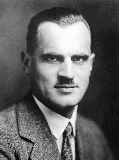Photon

A.H. Compton
History
The nature of light has long been disputed. According to the Dutch scholar Christiaan Huygens (1629 - 1695), among others, it was a wave phenomenon, but according to the English scientist Isaac Newton (1643 - 1727) - and many before and after him - it was a stream of particles. It was ultimately the scattering experiments of the American physicist Arthur Holly Compton (1892 - 1962) that provided convincing proof of the particle nature of light.Quantum mechanics managed to reconcile the wave description and the particle nature of light.